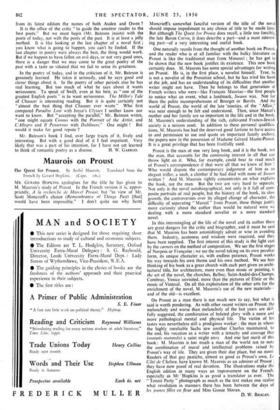Maurois on Proust
MR. GERARD HOPKINS apologises for the title he has given to M. Maurois's study of Proust. In the French version it is, appro- priately, A la recherche de Marcel Proust. but "in view of Mr. Scott Moncrieff's choice (Remembrance, of Things Past) [that] would have been impossible." I don't quite see why Scott Moncrieff's somewhat fanciful version of the title of the novel should impose impediment to any choice of title to be made later. But although The Quest for Proust does recall, a little too forcibly, the late Baron Corvo, it does describe a part—and a most interest. ing part—of a very interesting and useful book.
One naturally recoils from the thought of another book on Proust, and the reader who is at all familiar with the bulky literature on Proust is like the traditional man from Missouri ; he has got to be shown that the new book justifies its existence. This new book certainly does. M. Maurois has some special advantages for writing on Proust. He is, in the first place, a novelist himself. True, he is not a novelist of the Proustian school, but he has tried his hand at the job, and has an understanding of its difficulties that another writer might not have. Then he belongs to that generation of French writers who were—like Francois Mauriac—the first people to notice what an event, what a landmark, Swann was. Not for them the polite incomprehension of Bourget or Barres. And the world of Proust, the world of the late 'nineties, of the " Affair," was near enough to be felt and understood. Then, since Marcel's mother and her family are so important in the life and in the book, M. Maurois's understanding of the rich, cultivated Franco-Jewish society is a serious asset. In addition to these personal qualifica- tions, M. Maurois has had the deserved good fortune to have access to and permission to use and quote an important family archive, the papers now in the possession of Madame Gerard Mante-Proust. It is a great privilege that has been fruitfully used.
Proust is the man of one very long book, and it is the book, not the man, that accounts for the continuing interest in all that can throw light on it. Who, for example, could bear to read much of Proust's correspondence if that were all that we knew of him ? Who would dispute the contemporary judgement of him as an elegant trifler, a snob, a climber if he had died with none of Swann written ? And M. Maurois rightly concentrates on what explains the book, not the man. But the two are very hard to separate. Not only is the novel autobiographical, not only is it full of com- posite portraits of real people, but the history of the book, its slow growth, the controversies over its alleged change of character, the difficulty of separating " Marcel " from Proust, these things justify more curiosity about the author than would be natural were we dealing with a more standard novelist or a more standard novel.
In this intermingling of the life of the novel and its author there are great dangers for the critic and biographer, and it must be said that M. Maurois has been astonishingly adroit or wise in avoiding them. Industry, acuteness and wisdom were required, and they have been supplied. The first interest of this study is the light cast by the carnets on the method of composition. We see the first stages of Norpois or Francoise ; we see the novel taking on its own peculiar form, its unique character as, with endless patience, Proust works
his way towards his own theme and his own method. We see him thinking of his book as a great church with each part given an archi- tectural title, for architecture, more even than music or painting, is
the art of the novel, the churches, Balbec, Saint-Andre-des-Champs, Combray, Venice unvisited, more than the pictures of Elstir or the
music of Vinteuil. On all this exploitation of the other arts for the enrichment of the novel, M. Maurois's use of the new materials— and of the old—is excellent.
On Proust as a man there is not much new to say, but what is said is worth pondering. As with other recent writers on Proust, the melancholy and worse than melancholy of the last years are skil- fully suggested, the combination of belated glory with a more and more pathological mental and physical life. The victim of his tastes was nevertheless still a prodigious worker ; the man in whom the highly unreliable Sachs saw another Charlus maintained, to the end, his vocation as a writer with a tenacity and courage that (mutatis mutandis) a saint might envy And one last merit of this book: M. Maurois is too much a man of the world not to note the combination of moral and intellectual problems raised by Proust's way of life. They are given their due place, but no more. Readers of that gay pastiche, almost as good as Proust's own, Le Cote de Chelsea, have known M. Maurois as an admirer of Proust they have now proof of real devotion. The illustrations make the English edition in many ways an improvement on the French, especially as Mr Hopkins is as good a translator as ever. The " Tennis Party " photograph as much as the text makes one realise what revolution in manners there has been between the days of les jeunes fines en fleur and Miss Gussie Moran.
D. W. BROGAN.


































 Previous page
Previous page